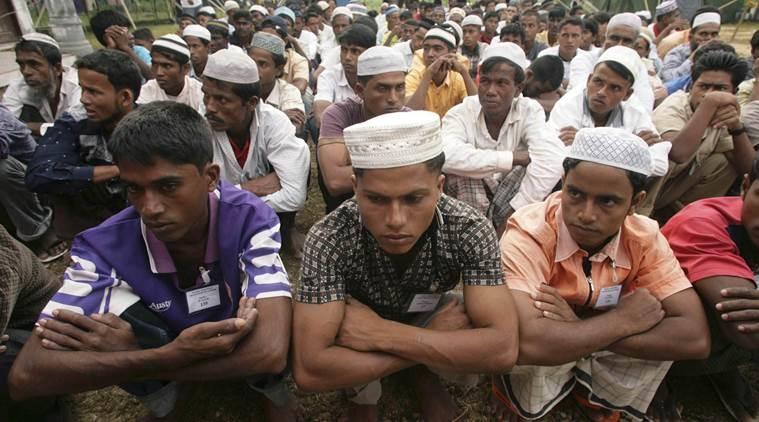Did Supreme Court Err in Sending the 7 Rohingya Refugees Back to Myanmar?

India deported seven Rohingya asylum seekers who had entered Indian “illegally” in 2012 on October 5, 2018. The Supreme Court allowed the deportation as the government told the Court that Myanmar had accepted the Rohingya as their citizens and has agreed to take them back. After the genocidal attack on Rohingya in Rakhine state of Myanmar on August 2017, which triggered the massive exodus of Rohingya asylum seekers to Bangladesh, this is the first instance of deportation of Rohingya back to Myanmar.
In its affidavit to the Supreme Court on the issue of deportation of Rohingya refugees to Myanmar, the Union government said that as it was not a signatory to the Refugee Convention of 1951 or the Protocol of 1967, it was not bound by the principle of 'non-refoulement', or not sending back refugees to a place where they face danger. It is strange that the Supreme Court accepted this argument, as the principle of non-refoulement is considered part of customary international law and, therefore, binding on all states whether they have signed the Refugee Convention or not. In addition, India is party to major international human rights instruments, such as the International Covenant on Civil and Political Rights, Convention on the Elimination of All Forms of Discrimination against Women and Convention on the Rights of the Child."
The Constitution of India does not not obligate or authorise the judiciary to draw on international law. However, it is relevant to note that Article 51, of the Constitution mandates the State to endeavour to promote international peace and security, to maintain good relations with other nations, to respect international law and to settle international disputes by peaceful means. Clause (c) of Article 51, obligates India to respect international law. A combined reading of this with Part III of the Constitution has facilitated the judiciary in developing human rights and environmental jurisprudence in India. This article has been relied upon by Indian courts to hold that various International Covenants, Treaties etc., particularly those to which India is a party or signatory, become part of domestic law insofar as there is no conflict between the two.
In Keshavanand Bharati vs State of Kerala, Chief Justice Sikri had observed, “In view of Article 51 of the Constitution this court must interpret language of the Constitution, if not intractable, which is after all a municipal law, in the light of United Nations Charter and the solemn declaration subscribed to by India”.
The Supreme Court’s acceptance of the argument that India is not bound to follow the principle of non-refoulement, is strange, as in the past, on the question of application of international laws for protection of refugees, in a number of cases Indian courts have protected the rights of refugees where there were substantial grounds that their lives would be in danger. Let me give a few examples;
- In the cases of Louise de Readt (1991 SCC 554) and Khudiram [(1994 Supp. (1), Scc 615] the Supreme Court had held that Article 21 of the Constitution of India, which protects the life and liberty of Indian citizens is extended to all, including aliens. In 1996, the Supreme Court of India had prevented the government of the state of Arunachal Pradesh from forcibly expelling Chakma refugees (Civil WPNo.720/95 1996 (1) Supreme 295).
- In Dr.Malvika Karlekar vs. the Union of India, Criminal 583 of 1992, in the writ petition the Supreme Court had held that the authorities should consider whether refugee status should be granted. And had directed that, “until this decision, the petitioner should not be deported.
- In the case of U. Myat Kayew & Nayzan Vs. State of Manipur, the Guwahati High Court’s order had clearly said that “all asylum seekers who enter India (even if illegally) should be permitted to approach the office of the UNHCR to seek refugee status” (Civil Rule No.516 of 1991).
- In Bogyi vs. Union of India, the Guwahati High Court had not only ordered the temporary release of a Burmese man from detention, but approved his stay for two months so that he could apply to the UNHCR for refugee status (Civil Rule 981 of 1989)
- In the case of Ktaer Abbas Habib Al Qutafi vs. Union of India, the Gujurat High Court had summarised the principles that emerged from Indian judicial precedent. According to the High Court, the government was obliged to respect the international conventions and treaties although these may not be enforceable and act in conformity with these conventions and treaties. The High Court had pointed out that the principle on non-refoulement was encompassed in Article 21 of Indian Constitution, so long as it was not prejudicial to national security. (CA3433 of 1998).
There are more than 200 Rohingya asylum seekers who are languishing in jails in different states of India. The deportation of the seven Rohingya refugees as “illegal immigrants” raises the fear that the government may be planning to deport all of them. And now that the Governments of India and Myanmar have started cooperating on the issue of “identifying” Rohingya in India, and the Indian police is forcing the Rohingya to fill and sign a so-called identification form developed by the Myanmar government, the likelihood of their deportation is even higher.
One Rohingya refugee told me, "This form is similar to the form which Myanmar government is forcing Rohingya inside Myanmar to fill up. We call it national verification form NVC. Myanmar has classified Rohingya as foreigners erasing their history, identities and existence". The Rohingya refugees in India are apprehensive that the information will be used to harass their relatives who are still living inside Myanmar. Also, on the basis of the information, they will be classified as "foreigners" living in Myanmar illegally. Rohingya refugees in Bangladesh have refused to fill and sign similar forms on the ground that these forms are not for the purpose of restoration of their citizenship.
Get the latest reports & analysis with people's perspective on Protests, movements & deep analytical videos, discussions of the current affairs in your Telegram app. Subscribe to NewsClick's Telegram channel & get Real-Time updates on stories, as they get published on our website.
























